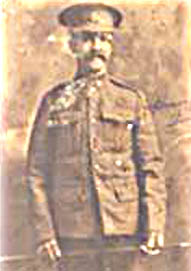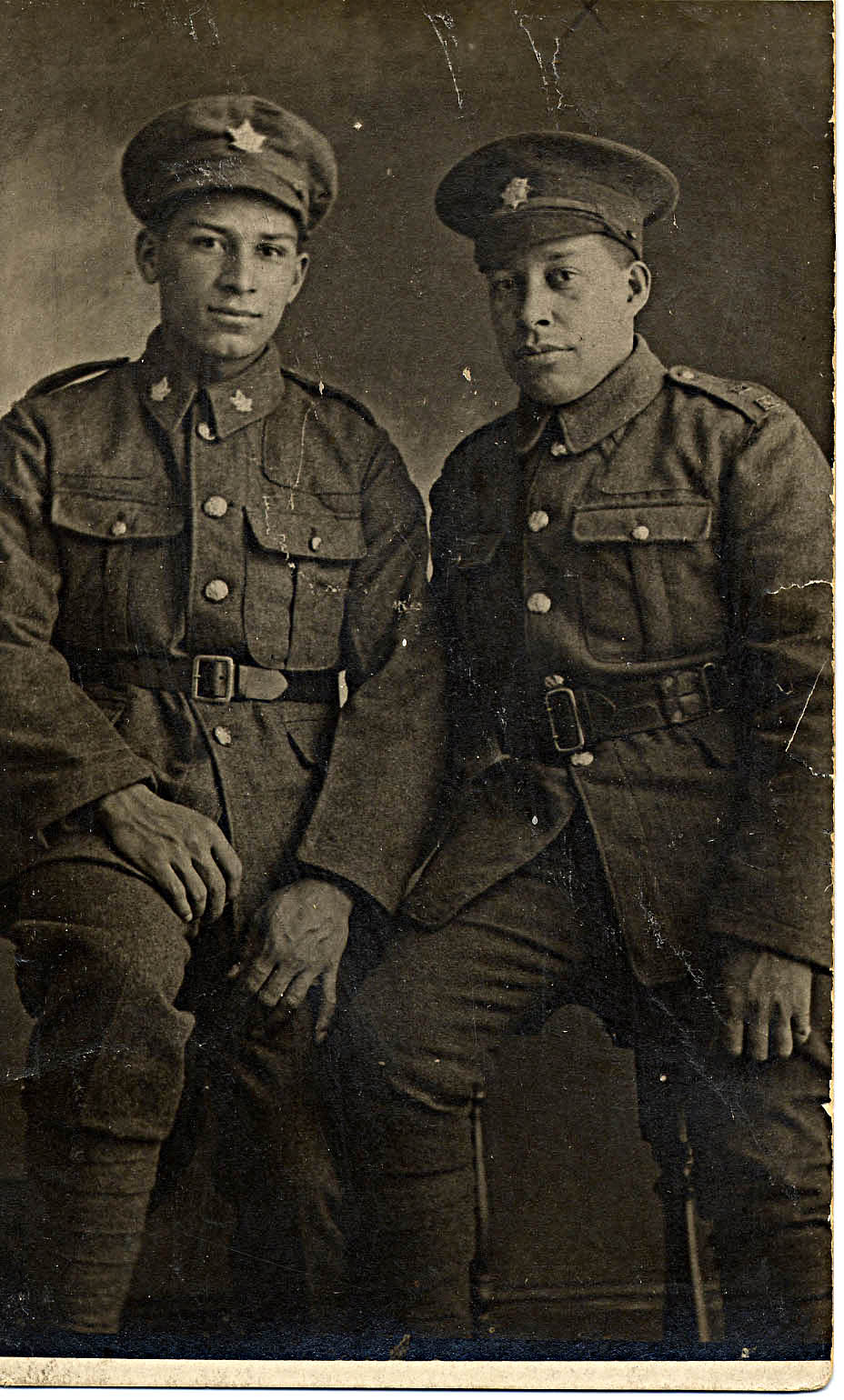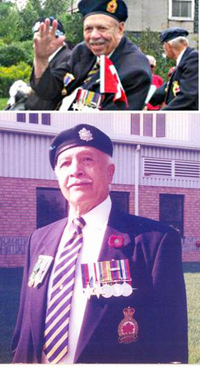Buxton Remembers Our Vets
by Spencer Alexander
Learn more about Buxton's MILITARY past
On Remembrance Day communities across the nation and the globe on the 11th hour on the 11th day of the 11th month will pause to remember, honour and pay tribute to those who served their country during the great wars so that we could enjoy the freedom and liberty that so many of us take for granted today.
Canadians participated and earned medals of valor in practically every major battle. Records tell of specific campaigns and battles and of many individual acts of courage which turned the tide of war. They note the skillful strategies and brilliant leadership. All these must be remembered, but other aspects of war must also be included in our histories. With every battle over this century, extremes of temperature, mud, mutilation, mind- numbing fatigue, fear and death were daily realities for those who participated in these battles.
There was an intense personal relationship which developed among the men who served their country overseas making the war years the most impressionable of their lives. There was a fierce loyalty and a very special love among men who had enlisted and trained together, raised hell together and acted as surrogate brothers during the long war years. The regiment was their home, their extended family. Theirs was a loyalty that drove men almost beyond the limits of courage and endurance - and for all too many, sadly forever beyond.
  |
George Bolivar Shreve; Arnold & Sidney Black (circa WWI) |
The First World War 1914-1918
In the First World War, the Canadians first major battle was later seen as one of the most crucial battles in history. At Ypres, April 22, 1915, the Germans used poison gas for the first time in war. As 145 tons of chlorine gas drifted over the trenches, the Canadian troops held and stopped the German advance. The casualties here and at the later battle near St. Julien were enormous. In 48 hours, one of every three Canadians was killed. Commanders persistently applied for more men, more guns and more ammunition, the conflict developed into a war of attrition with opposing sides struggling to hold out the longest against destruction. Some who survived left records of the aftermath of these horrific days. One soldier's words were, "The room was filled with dying and badly wounded men; trampled straw and dirty dressings lay about in pools of blood. The air, rank with the fumes of gas, was thick with the dust of flying plaster and broken brick, and stifling with the smoke from the burning thatch".
In April 1917, the Canadians helped turn the tide of battle when they won a major victory at Vimy Ridge. This triumph to had its cost; more than ten thousand casualties in six days. The war continued for more than a year but finally on Nov. 11, 1918 the Armistice was signed and the Canadians took part in the triumphant entry into Mons Belgium. The signing of the Armistice brought relief to the whole world. The horrible struggle with its death, destruction and misery was at last halted. It had truly been a world war. Sixty five million men from thirty nations bore arms in it; at least ten million were killed; twenty nine million more were wounded, captured or missing; and the financial cost was measured in the hundreds of billions of dollars; never before had there been such a conflict.
The Great War was also a landmark in Canadian national development. In 1914, Canada entered the war as a colony, a mere extension of Britain overseas; in 1918, she was forging visibly ahead to nationhood. Canada began the war with one division of citizen soldiers under the command of a British General, and ended with a superb fighting force under the command of one of her own sons. For a nation of then eight million people Canada's war effort was remarkable. A total of 619,636 men and women served in the Canadian forces in the First World War, and of these 66,655 gave their lives and another 173,000 were wounded. Nearly one of every ten Canadians who fought in the war did not return home. Throughout this conflict, Canadians proved that they could pull their weight, and by their effort earned for Canada a new place among the nations of the world. It was this Canadian war record that won for Canada a separate signature on the Peace Treaty signifying that national status had been achieved. Nationhood was purchased for Canada by the gallant men, who stood fast at Ypres, stormed Regina Trench, climbed the heights of Vimy Ridge, captured Passchendaele and entered Mons on Nov 11, 1918.

 |
(top) Laverne Robbins
(bottom) Alexander Brothers: Ronald, Philip, & John
(circa WWII)
|
World War Two 1939-1945
For almost six years, Canadians fought valiantly on battlefronts around the world. One million, eighty-six thousand and three hundred and forty-three Canadian men and women enlisted in the army, the navy and the air-force. They were prepared to face any ordeal for the sake of freedom. On the home front as well Canadians were active as munitions workers, as civil defense workers, as members of voluntary service organizations and as ordinary citizens doing their part to support the war effort.
In December 1941, Canadian soldiers were participants in the unsuccessful defense of Hong Kong against the Japanese; 290 Canadians were killed and 493 were wounded. Those who survived the fighting were imprisoned and many did not survive the brutality they experienced while held prisoner. For the majority, the daily diet while prisoner of the Japanese was a hand full of rice for each prisoner. Occasionally, a concoction of scavenged potato peelings, carrot tops and butter cups was brewed. The effects of this diet were obvious; Sidney Skelton watched the 900 calorie a month diet shrink his body from 145 pounds to 89 pounds. He stated whenever a group of prisoners could bribe a guard into giving them a piece of bread; they used a ruler to ensure everyone got an equal share.
In August 1942, the attack upon Dieppe was launched. Canadians made up almost ninety percent of the assault force. The raid was a disaster. Of a force of 4,963 Canadians, 3,367 were casualties, only 2,210 returned to England - the remainder were dead or were prisoners of war. Lucian Dumais gave the following description of the beach after the landing; "The beach was a shambles, and a lot of our men from the second wave were lying there either wounded or dead. Some of the wounded were swimming out to meet our flotilla and the sea was red with their blood. Some sank and disappeared. We stood by as they died, powerless to help; we were there to fight, not to pick up the drowning and the wounded. But the whole operation was beginning to look like a disaster".
 |
Wearing the medals they earned during WWII, serving overseas in France, Holland, England, Italy and Germany.
Above: Lester Brown
Below: John Alexander |
Canadians continued to play a part as the war went on. They participated in the conquest of Sicily in 1943 and in the advance up the Italian peninsula. On June 6th 1944, the Canadians were in the front lines of all the Allied forces that landed on the beaches of Normandy on D-Day. My father John Arthur Shreve Alexander took part in the D-Day invasion. He was a member of "A" Company of the Queens Own Rifles of Canada and was on the first Canadian ship to hit Juno Beach on D-Day. Of the 33 original members of "A" Company only 6 returned home. The others lost their lives on the battlefield, 22 of them within the first 15 seconds after landing on Juno Beach. It remains to this day the largest military invasion in the history of warfare. All three Canadian services shared in the assault, the fighting was fierce and the losses were heavy. Of the approximately 14,000 Canadians who landed, there were 1,074 casualties of which 359 were fatal. Many stories have been written about the D-Day invasion as told by those who survived it and each individuals account is of equal interest and importance. As the Allied forces continued to push their way across Europe, it was evident the war would continue into 1945.
In May 1945, victory in Europe became a reality and V-E Day was celebrated by millions. Still ahead lay the final encounter with Japan. On August 6th, 1945, the Americans dropped the first atomic bomb on Hiroshima. Three days later a second bomb destroyed Nagasaki. On August 14th, 1945, the Japanese accepted the Allied terms of unconditional surrender and the Second World War was over. But only after 42,042 Canadians were dead and another 53,145 wounded. Throughout the Second World War the Canadians once again proved they were a force to reckoned with, and by their effort gained a reputation as being one of the most respected, determined and feared fighting forces among the nations of the world.
The Korean War 1950 - 1953
Canadian soldiers were again called into action in 1950 to uphold the ideals of the United Nations against aggression by North Korean forces. By 1951 they were also at war with the Peoples Republic Of China. In Korea, the Canadians were participants at Kapyong, at Chail-li, in the advance across the Imjin River, and in the patrolling of Choiwon Plain.
The conditions in Korea were often difficult. Variable weather, rough terrain, an elusive and skillful enemy - combined with casualties, illness and limited medical facilities were common elements. The winter of 1951 brought the realities into focus for the Canadians. At this time they were living twenty four hours a day in trenches which provided some protection but little comfort. As one soldier recalled, the weather aggravated what was already a demoralizing experience; "Rain was running down my neck, my hands were numb, and I never seemed to be dry. Kneeling in the snow, or advancing in the rain, my knees and the front of my legs became wet. Then the dampness soaked right through and the skin underneath became tender and raw". Altogether, 26,791 Canadians served in the Korean War and another 7,000 served between the ceasefire and the end of 1955. Casualties numbered 1,558 of which 516 were fatal.
Today
Canadian soldiers today are deployed around the world in new efforts to promote international freedom and maintain world peace. From all the records of war, the observations and stories of those who took part in these battles stand out as reminders of the true nature of conflict. War has many faces, but few if any of them are pleasant. Only those who have seen their comrades killed in action and have survived the ravages of war know the true horror of it. One thing these Veterans know for sure is that on the battlefield there is no comfortable time or place for a young man to die.
Perhaps, it is in the works of great poets where all the aspects of war; deep sadness, ambivalence and a host of other emotions are most eloquently portrayed. And one of the most well known war poems ever written is "In Flanders Fields". The poem was written by Canadian army physician Major John McCrae. It is a lasting legacy of the terrible battle at Ypres in the spring of 1915. The poem initially called (We Shall Not Sleep) was very nearly not published. John McCrae tossed it away, but Morrison retrieved it and sent it to newspapers in England. The Spectator, in London rejected it, but Punch magazine published it on Dec. 8th, 1915.
In Flanders Fields
By John McCrae
In Flanders Fields the poppies blow
between the crosses, row on row,
that mark our place; and in the sky
the larks, still bravely singing, fly
Scarce heard amid the guns below.
We are the dead. Short days ago
we lived, felt dawn, saw sunset glow,
loved, and were loved, and now we lie
in Flanders Fields.
Take up our quarrel with the foe;
To you from failing hands we throw
the torch; be yours to hold it high.
If ye break faith with us who die
we shall not sleep, though poppies grow
in Flanders Fields.
On Nov. 11th I will attend a Remembrance Day Ceremony in Chatham-Kent, but I know I will walk away with more than the usual feelings of mournfulness mixed with hope and pride in my country. I will also feel a profound sadness that Remembrance Day just isn't how I remember it.
As a child, I saw Remembrance Day as a time of ritual and quiet reflection. We made construction paper poppies at school and drew pictures of the crosses row on row in Flanders Fields. On Nov.11th we didn't go to school, but rather to the local cenotaph to hear the bagpipes and the bugle, to lay wreaths, to see the veterans my father among them, their uniforms weighed down with medals. We went to hear read aloud the long list of names of the local men who sacrificed their lives in the two World Wars and in Korea. --- On Nov.11th the world stood still.
Tomorrow I will stand quietly at this ceremony along with some three hundred mostly older people in observance of Remembrance Day. But around us the world will not stand still. Cars and trucks will roar by drowning out the service, stores will remain open, real estate agents will make deals over coffee at Tim Hortons, children will go to school and nannies will push strollers down the sidewalk.
To most people it will be just another day… War has become an abstraction, something that happens far away, to people we don't know. And peace is just as abstract to the younger generation - they can't appreciate it because they have never experienced anything else. So Remembrance Day fades with every passing year. The veterans die off, and it seems as if few young people care. Most are too busy to fit a few moments of silence into their schedules and business owners won't forego a few sales to close up shop for an hour. It seems that nobody cares about a few elderly people in uniform marching with their flags and pipers, reminding us that life hasn't always been so pleasant. That in a time before long range missiles, war meant your son, your father, and your brother fought the enemy face to face and maybe never came home again.
Is it asking too much that everyone just stop what their doing, to give just one hour out of 8,760 hours in a year to honor those brave soldiers who gave the rest of their lives for us? Are we so caught up in ourselves and careers, that we have forgotten the alternatives to peace and prosperity? Doesn't anyone appreciate the selflessness of those brave soldiers who fought and returned home and those who died in battle and whose ghost remain forever young on the battlefields of foreign lands?
How the tears well up in my eyes as I remember and think that if were not for those brave Canadian soldiers, I wouldn't be here.
That, to me, is worth every hour of every day.
Top of page